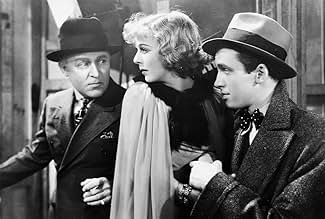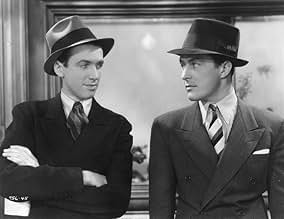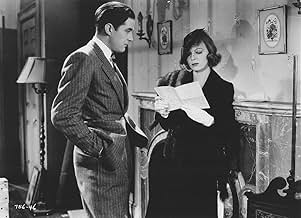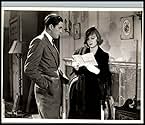AVALIAÇÃO DA IMDb
6,4/10
716
SUA AVALIAÇÃO
Adicionar um enredo no seu idiomaA young married couple's relationship becomes strained when he is assigned overseas as a foreign correspondent and she becomes a major stage star.A young married couple's relationship becomes strained when he is assigned overseas as a foreign correspondent and she becomes a major stage star.A young married couple's relationship becomes strained when he is assigned overseas as a foreign correspondent and she becomes a major stage star.
- Direção
- Roteiristas
- Artistas
- Prêmios
- 3 vitórias no total
Ray Milland
- Tommy Abbott
- (as Raymond Milland)
Ronnie Cosby
- Kit
- (as Ronald Cosbey)
Arthur Aylesworth
- Secretary
- (não creditado)
King Baggot
- Character man
- (não creditado)
Tommy Bond
- Pesky Kid
- (não creditado)
Harry C. Bradley
- Desk Clerk
- (não creditado)
Tyler Brooke
- Author
- (não creditado)
Daisy Bufford
- Maid
- (não creditado)
Jack Cheatham
- Taxi Driver
- (não creditado)
Jack Daley
- Conductor
- (não creditado)
John Dilson
- Stage Manager
- (não creditado)
Charles Fallon
- Prof. Dindet
- (não creditado)
Avaliações em destaque
Jimmy Stewart's first big role. This is not a romance we are used to with a happily ever after ending. Not even close. Maybe that would make it interesting and worthwhile but meh, I'm not all that impressed with this. You can see the immense talent in the young 27 year old Jimmy but he is still very much coming into his own here. Not the best vehicle for him considering I would never guess his character to be a man under at least 30. Quite a mature role for such a youngster to Hollywood. Still an okay, quick film that isn't his best but is from such a great era that it's hard to say it's bad!
5.7 / 10 stars
--Zoooma, a Kat Pirate Screener
5.7 / 10 stars
--Zoooma, a Kat Pirate Screener
In New York, the rookie newsman Christopher "Chris" Tyler (James Stewart) dreams on becoming a famous journalist. When his girlfriend Cicely (Margaret Sullavan) spends a couple of days with him, they decide to get married and Cicely leaves college. Chris's best friend Tommy Abbott (Raymond Milland) is his best man and becomes a family's friend. Chris has his great chance when his editor Frank Carteret (Robert McWade) sends him to Rome assigned as a foreign correspondent. Cicely stays in New York with Tommy and does not tell to Chris that she is pregnant. When she delivers the baby Kit, Chris celebrates and loses a big scoop and his boss fires him. Chris falls in disgrace and the couple has economic difficulties; however Tommy lends money to Cicely and offers an opportunity on the stage as an actress. Cicely is hired and becomes successful and Chris is depressed with the situation. Cicely seeks out Frank Carteret and explains the situation, and he offers a job opportunity to Chris in Russia. He accepts the job but Cicely stays in New York with their son. Along the years, their marriage ends with the distance, but they are still in love with each other.
"Next Time We Love" is a romantic melodrama ahead of time with a mature story of career conflict with marriage, causing separation, reconciliation and infidelity of the two leads. This theme is impressive for a 1936 movie, where usually the woman is submissive and dependable of man's possessions. My vote is seven.
Title (Brazil): "Amemos Outra Vez" ("We Love Again")
"Next Time We Love" is a romantic melodrama ahead of time with a mature story of career conflict with marriage, causing separation, reconciliation and infidelity of the two leads. This theme is impressive for a 1936 movie, where usually the woman is submissive and dependable of man's possessions. My vote is seven.
Title (Brazil): "Amemos Outra Vez" ("We Love Again")
Stewart's first breakout role. The magnetism between Sullavan and Stewart is undeniable in this sophisticated story about a couple whose careers don't quite mesh. Their divergent careers inevitably causes their marriage to be a rocky one with many ups and downs. The plot, although a progressive one ahead of its time, is not an appealing one. I wanted to like this movie, but the plot kept me from it. It fell flat and seemed rushed.
Sight unseen this movie has a number of factors in its favor: 1) it stars two of the most charismatic performers of Hollywood's Golden Age, James Stewart & Margaret Sullavan, paired for the first time; 2) it features the underrated Ray Milland as Jimmy's best friend, who becomes the third player in their romantic triangle; 3) several of Hollywood's familiar character actors appear in supporting roles (Grant Mitchell, Hattie McDaniel, Christian Rub, etc.), and 4) its story was born in the typewriter of the legendary Preston Sturges, one of the all-time great screenwriters. According to various biographies of Sturges he spent a couple of weeks on the first draft of this drama while simultaneously cranking out a comedy for Carole Lombard called Love Before Breakfast. Sturges' script for Next Time We Love was then handed off to an obscure writer named Melville Baker who revised it, but in the end only Baker received screen credit. It would appear that this project meant little to Sturges, but, bearing in mind the memorable results when Margaret Sullavan took the title role of his brilliant adaptation of The Good Fairy in 1935, I sat down to watch this one hoping it might also be something special.
Unfortunately, and despite a decent opening half-hour or so, this film ultimately disappoints. Stewart and Sullavan have good chemistry and make a believable couple. We follow the course of their relationship with interest as they marry on impulse and Stewart aggressively pursues a career in journalism while Sullavan takes a more casual interest in stage acting, while best friend Milland maintains a steady presence in the background. Stewart & Sullavan have a baby, but trouble soon develops: her career in the theater suddenly takes off just as his progress at the newspaper hits a brick wall. Tension mounts as she becomes the breadwinner after he screws up a major assignment and is fired. They separate, and Sullavan flourishes while Stewart avoids coming home and stays out of the picture. Milland, at this point, finally steps forward and makes his feelings known.
More plot twists come along, but for me the movie starts to fizzle along about the time Sullavan's acting career takes off. Important events occur too abruptly, without the appropriate build-up: all of a sudden, she's a famous and powerful Broadway star. It looks as if some backstage scenes were filmed but then cut, suggested by the fact that Grant Mitchell, who plays a theatrical producer, receives fourth billing in the credits though he appears in only one brief scene. From that point onward Sullavan's stardom seems unreal while the behavior of Stewart's character becomes increasingly melodramatic and unbelievable. In the later scenes none of the main characters behave like recognizable human beings, and despite the best efforts of these estimable actors we no longer buy anything they're saying or doing by the climax. The story raises a provocative issue, i.e. the conflict that results when a wife earns more money than her husband and thus wields more power, but the filmmakers chickened out without really addressing the matter, choosing a sappy "Hollywood" resolution over anything genuinely satisfying.
Next Time We Love is fairly interesting nonetheless, worth seeing if you enjoy Hollywood melodramas of the '30s and certainly if you're a fan of the stars, but in the end it doesn't amount to much. Fans of Preston Sturges will be hard pressed to recognize his contribution, and may prefer to skip this one and enjoy one of his more characteristic works instead.
Unfortunately, and despite a decent opening half-hour or so, this film ultimately disappoints. Stewart and Sullavan have good chemistry and make a believable couple. We follow the course of their relationship with interest as they marry on impulse and Stewart aggressively pursues a career in journalism while Sullavan takes a more casual interest in stage acting, while best friend Milland maintains a steady presence in the background. Stewart & Sullavan have a baby, but trouble soon develops: her career in the theater suddenly takes off just as his progress at the newspaper hits a brick wall. Tension mounts as she becomes the breadwinner after he screws up a major assignment and is fired. They separate, and Sullavan flourishes while Stewart avoids coming home and stays out of the picture. Milland, at this point, finally steps forward and makes his feelings known.
More plot twists come along, but for me the movie starts to fizzle along about the time Sullavan's acting career takes off. Important events occur too abruptly, without the appropriate build-up: all of a sudden, she's a famous and powerful Broadway star. It looks as if some backstage scenes were filmed but then cut, suggested by the fact that Grant Mitchell, who plays a theatrical producer, receives fourth billing in the credits though he appears in only one brief scene. From that point onward Sullavan's stardom seems unreal while the behavior of Stewart's character becomes increasingly melodramatic and unbelievable. In the later scenes none of the main characters behave like recognizable human beings, and despite the best efforts of these estimable actors we no longer buy anything they're saying or doing by the climax. The story raises a provocative issue, i.e. the conflict that results when a wife earns more money than her husband and thus wields more power, but the filmmakers chickened out without really addressing the matter, choosing a sappy "Hollywood" resolution over anything genuinely satisfying.
Next Time We Love is fairly interesting nonetheless, worth seeing if you enjoy Hollywood melodramas of the '30s and certainly if you're a fan of the stars, but in the end it doesn't amount to much. Fans of Preston Sturges will be hard pressed to recognize his contribution, and may prefer to skip this one and enjoy one of his more characteristic works instead.
Among all of Jimmy Stewart's films, "Next Time We Love" is among the more obscure...even though there is some really terrific acting in it as well as three top actors (Margaret Sullavan, Jimmy Stewart and Ray Milland). As far as why it's not a popular film, I have a strong guess....it's not a particularly enjoyable picture and you have a hard time really caring about the characters.
The story itself is a great illustration of the old saying, "Act in haste, repent at leisure". This is because Cicely and Chris (Sullavan and Stewart) meet and decide to get married only a few days later. It's clearly an impulsive move and even before the honeymoon it's clear this will NOT be an easy marriage. Chris is a newspaper correspondent and likes the idea of traveling the world to report the news. This is clearly NOT a career conducive to a great marriage. But to make it worse, Cicely soon takes up acting and she likes it...and it pays well. In fact, when Chris loses a job, she carries them. This SHOULD make them happy but it doesn't. After all, it's the 1930s and a man, a 'real man', was expected to be the bread-winner and a wife was to stay home, make babies and wait for her man to come home from work--which was impossible with being a correspondent and her being an actress. So, years pass and Chris roams the world while Cicely becomes famous...and they barely have any time for each other. Both have created their own separate lives...and all the while, their good friend Tommy (Milland) is there to help Cicely...and soon it becomes apparent Tommy wants to be more than just a friend.
So basically you have two strong-willed people who are more concerned with their careers than each other...something hardly the stuff of a romance or fun film. In many ways, I wonder how much this story was influenced by the Hollywood life...and broken marriages. Either way, the acting is stupendous (particularly by Sullavan)...but the film is still unpleasant and not particularly involving for me. As for me, I just wanted to slap them both and tell them to grow up! After all, they had a child and yet they seemed a bit childish themselves.
The story itself is a great illustration of the old saying, "Act in haste, repent at leisure". This is because Cicely and Chris (Sullavan and Stewart) meet and decide to get married only a few days later. It's clearly an impulsive move and even before the honeymoon it's clear this will NOT be an easy marriage. Chris is a newspaper correspondent and likes the idea of traveling the world to report the news. This is clearly NOT a career conducive to a great marriage. But to make it worse, Cicely soon takes up acting and she likes it...and it pays well. In fact, when Chris loses a job, she carries them. This SHOULD make them happy but it doesn't. After all, it's the 1930s and a man, a 'real man', was expected to be the bread-winner and a wife was to stay home, make babies and wait for her man to come home from work--which was impossible with being a correspondent and her being an actress. So, years pass and Chris roams the world while Cicely becomes famous...and they barely have any time for each other. Both have created their own separate lives...and all the while, their good friend Tommy (Milland) is there to help Cicely...and soon it becomes apparent Tommy wants to be more than just a friend.
So basically you have two strong-willed people who are more concerned with their careers than each other...something hardly the stuff of a romance or fun film. In many ways, I wonder how much this story was influenced by the Hollywood life...and broken marriages. Either way, the acting is stupendous (particularly by Sullavan)...but the film is still unpleasant and not particularly involving for me. As for me, I just wanted to slap them both and tell them to grow up! After all, they had a child and yet they seemed a bit childish themselves.
Você sabia?
- Curiosidades"Lux Radio Theater" broadcast a 60 minute radio adaptation of the movie on November 7, 1938 with Margaret Sullavan reprising her film role.
- Citações
Frank Carteret: It's amazing! The things people ask of love. They expect it to protect them, keep them from being bored, make them work harder. In fact , they want everything except love.
- Versões alternativasCurrent prints of this film feature the Universal logo created in late 1936, and say "The New Universal Presents". That is because they were made after studio founder Carl Laemmle was ousted from Universal Studios and the takeover of the studio by a new conglomerate. The picture was actually released before Laemmle left. That is why the "The End" credit features an airplane circling the globe, the logo that Universal used while Laemmle was in power.
- ConexõesFeatured in Great Performances: James Stewart: A Wonderful Life (1987)
Principais escolhas
Faça login para avaliar e ver a lista de recomendações personalizadas
- How long is Next Time We Love?Fornecido pela Alexa
Detalhes
- Data de lançamento
- País de origem
- Idioma
- Também conhecido como
- Next Time We Love
- Locações de filme
- Empresa de produção
- Consulte mais créditos da empresa na IMDbPro
- Tempo de duração1 hora 27 minutos
- Cor
- Proporção
- 1.37 : 1
Contribua para esta página
Sugerir uma alteração ou adicionar conteúdo ausente

Principal brecha
By what name was Amemos Outra Vez (1936) officially released in Canada in English?
Responda

































